Birthday shock: How MS ended an England footballer's career
- Published
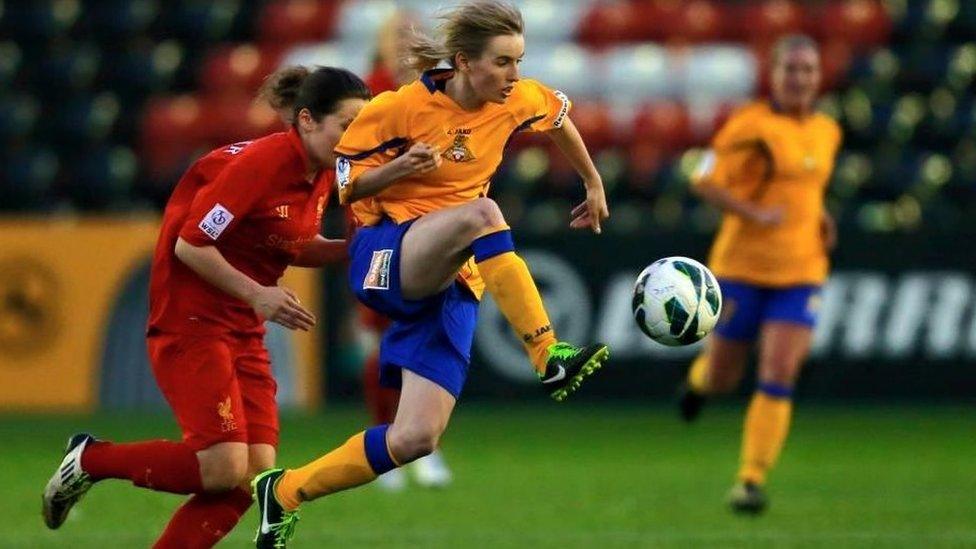
England batsman James Taylor this week announced his retirement from cricket at the age of 26 owing to a serious heart condition. One person who knows how it feels to have a successful sporting career ended suddenly by a medical condition is England footballer Ashleigh Mills.
Ashleigh Mills played football for Doncaster Rovers Belles and was a rising star for England, but last month, a day after she turned 20, she was diagnosed with multiple sclerosis (MS) and forced to retire from the game.
"It came out of the blue," she says of the first symptoms. "It was match day last year and I woke up and couldn't feel my right foot.
"I went to see the club's physio and he said I looked alright. I probably should have told him the feeling was spreading up my legs but I played for 60 minutes. By the end I didn't have any feeling from my hips all the way down to my feet."
The numbness was the first indication of MS. The non-hereditary neurological disease is the result of the protective layer surrounding nerve fibres - known as myelin - becoming damaged. The immune system them mistakenly attacks it, causing scarring or sclerosis.
Symptoms include sight loss, fatigue, mobility issues and memory and cognitive problems. The pattern of MS varies between individuals and changes over time making it difficult to predict the course of the disease.
For Mills it was an unexpected shock and an end to the professional football career she had been dreaming of since childhood.
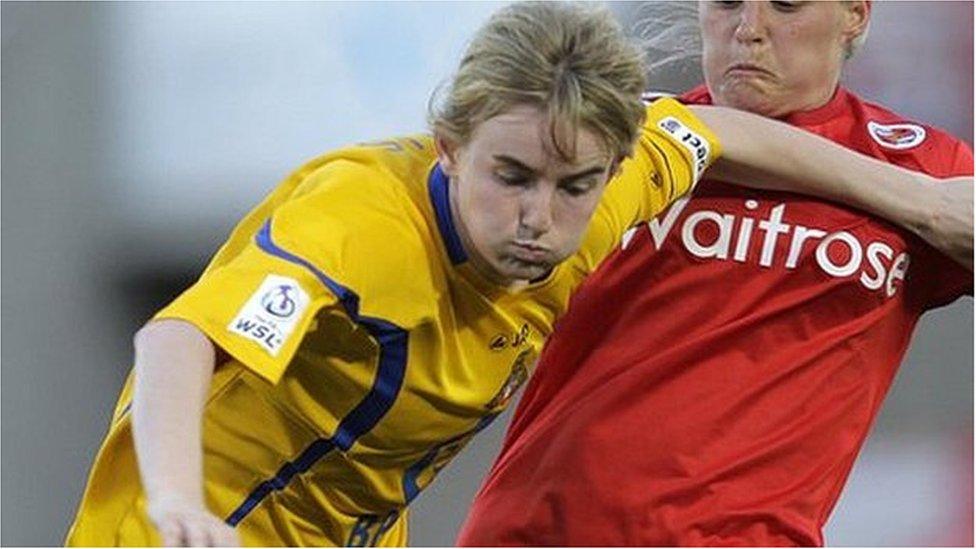
A few weeks after joining the Belles Ashleigh Mills received a call-up to the England U19 squad, making her debut in 2014
She was signed to the Women's Super League One side at the age of 17 and received her call-up from the England U19 squad within weeks. Her debut for the national side came in 2014 at the age-group European Championships in Norway. England were knocked out in the group stages but it left Mills with the drive and ambition to make it in the game.
During the first bout of the disease the numbness in her foot and heaviness in her legs persisted and after several days she visited her GP, heralding the start of a year-long road to diagnosis. In March 2016 - almost a year to the day after the symptoms emerged - she was told she had relapsing and remitting MS. In other words, the symptoms come and go, with the body repairing itself before another attack.
"Me and my parents were shocked and upset when they first mentioned it could be MS, but by the time they said it actually was that, we'd accepted it. By then I knew all the symptoms so I was sort of expecting it, but I couldn't really believe I'd have to retire, because football is all I know."
There are several strains of MS - 85% of people are initially diagnosed with relapsing and remitting MS while many go on to develop secondary progressive MS where the condition continues to deteriorate.

Multiple sclerosis
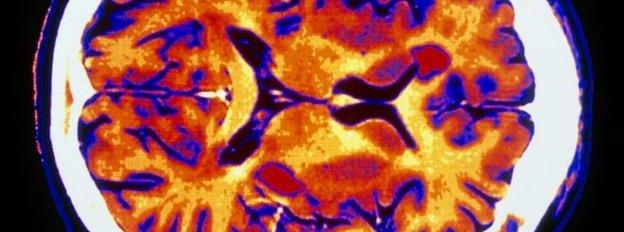
The two red areas - top right and lower centre - on this image of an MS patient's brain show the lack of myelin around nerve fibre
MS affects more than 100,000 people in the UK with a ratio of 3:1 women being diagnosed
It attacks the nervous system. Symptoms include sight loss, pain and fatigue
MS is unpredictable - one day you can be fine, the next you may lose your sight
The MS Society, external helpline: 0808 800 8000

Dr Emma Gray, head of clinical trials for the MS Society says: "Genes and environmental factors combine in a complex interaction to cause MS. We've discovered over 100 genes which increase your risk, but don't mean you're going to get it, and environmental factors can include vitamin D deficiency - but we don't currently know what the formula between the two is."
The majority of those diagnosed are in their 20s or 30s. At 19, Mills was on the younger side, although cases have been seen in two-year-olds. On average it is thought to reduce life expectancy by seven years, although the quality of life is greatly impacted as people deteriorate.
While awaiting her diagnosis, the remissive nature of Mills' strain meant she had periods of good health.
"I got back into playing and they offered me another contract," she says. "I felt much better, but I also knew, while I was trying my best, I wasn't getting any fitter. Sometimes I'd be fine. One week I was with the U19s and had a tournament and played every game and then it happened again. I just couldn't feel my feet and couldn't stand anyone touching my legs, it felt like something was constantly wrapped around them. I couldn't walk without holding on to Mum - I just couldn't believe it had happened again."
She says regular training became more difficult, more exhausting, and after speaking with her parents she called a meeting with the club manager who agreed she wasn't progressing. With a "heavy heart" the club announced her retirement which she says was a "terrible" moment.
"This past couple of months has been so frustrating," she says. "I had been working really hard in pre-season to get back to top level fitness but this disease won't let me and retiring was terrible.
"I've been training a few times because they say exercise can help but the elite level fitness is just too much. I would do one sprint and I just couldn't run back to the start again because I was so tired."

Danny Wallace played for England but retired in 1996 following his diagnosis of MS
Mills is not the first England footballer to retire prematurely.
In 1996 Danny Wallace hung up his boots after it was found the number of injuries he had sustained and his loss of form was down to MS. He also reported pain and numbness in his feet and following one match said "kicking the ball was like kicking a balloon full of water".
Both Mills and Wallace remain positive in the face of this challenge. Wallace set up the The Danny Wallace Foundation to raise money and awareness, while Mills is studying for a degree in sports coaching. There has also been interest from other disability sports teams who want to harness her skills.
There is a choice of 11 approved treatments for patients to choose from to help manage their condition, which are delivered through injections, infusions or tablets and prevent the immune system attacking the myelin. Mills also has weekly oxygen treatment at Sheffield's hyperbaric chamber which she, and many others, find eases the discomfort, although it is not currently a recognised therapy.
"It helps return the feeling at the bottom of my feet," she says. "When I've missed it I can tell, because when I drive and my key-ring touches my leg it feels like a bullet, it hurts because it's so cold, but when I have the oxygen it doesn't hurt. Despite treatment my right foot isn't the same and I don't think it will ever come back."
As well as the physical change to her life she's facing, there is also the emotional upheaval. The MS Society says about 66% of people diagnosed experience anxiety or depression and it offers a helpline staffed by several counsellors.
Mills has started coming to terms with the end of her career but says while she wants to be there for her teammates, it often does nothing but reinforce her absence from the pitch.
"I've been to see them play Chelsea twice so far," she says. "The second time it wasn't nice as I knew I couldn't play again and it hit me and I just wished I could be on the pitch. I could see some of my younger friends who were on the bench and I just wished that could be me playing out there.
"But I'm quite positive, you've got to be."
- Attribution
- Published12 April 2016
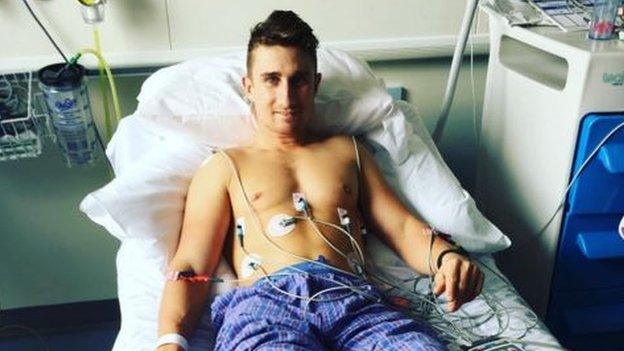
- Attribution
- Published10 March 2016
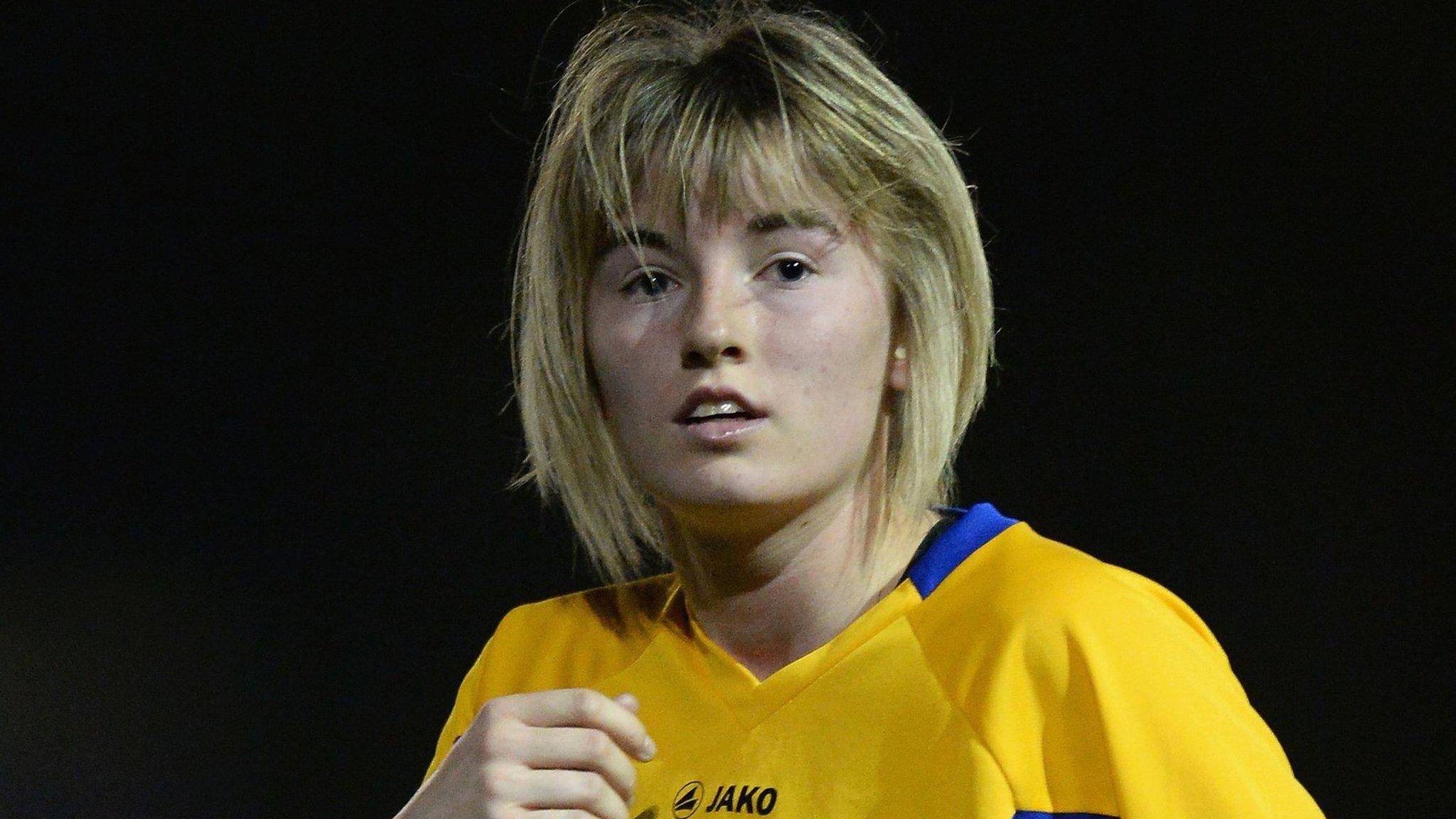
- Published18 January 2016
- Published18 January 2016
